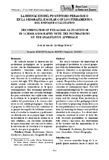Mostrar el registro sencillo del ítem
La innovación del positivismo pedagógico en la geografía escolar con los fundamentos del enfoque cualitativo
| dc.rights.license | http://creativecommons.org/licenses/by-nc-sa/3.0/ve/ | es_VE |
| dc.contributor.author | Santiago Rivera, José Armando | |
| dc.date.accessioned | 2022-03-07T13:39:42Z | |
| dc.date.available | 2022-03-07T13:39:42Z | |
| dc.date.issued | 2022-03-07 | |
| dc.identifier.issn | ISSN: 1690-3544 | |
| dc.identifier.uri | http://www.saber.ula.ve/handle/123456789/47869 | |
| dc.description.abstract | El artículo analiza la innovación del positivismo pedagógico en la geografía escolar con los fundamentos del enfoque cualitativo. Considera como obstáculo epistémico la firmeza de los conocimientos y prácticas positivas promovidas en el acto educante de la enseñanza geográfica, a partir del siglo XIX. El problema es que impide asumir críticamente las situaciones geográficas comunitarias de la época contemporánea. Eso determinó metodológicamente realizar una revisión bibliográfica para estructurar una explicación sobre la enseñanza de la geografía positiva y el cambio del positivismo a la ciencia cualitativa en este ámbito pedagógico. Concluye al proponer la alfabetización ciudadana en su propio desempeño de habitante comunitario, al estudiar las temáticas y problemáticas identificadas en su propio lugar. Se trata de reivindicar la condición de actores de la vida cotidiana, con excelentes posibilidades para humanizar con conciencia crítica, la intervención del territorio y la organización de su espacio geográfico. | es_VE |
| dc.language.iso | es | es_VE |
| dc.publisher | SaberULA | es_VE |
| dc.rights | info:eu-repo/semantics/openAccess | es_VE |
| dc.subject | Positivismo | es_VE |
| dc.subject | Ciencia cualitativa | es_VE |
| dc.subject | Innovación | es_VE |
| dc.subject | Geografía escolar | es_VE |
| dc.title | La innovación del positivismo pedagógico en la geografía escolar con los fundamentos del enfoque cualitativo | es_VE |
| dc.title.alternative | The innovation of pedagogical positivism in school geography with the foundations of the qualitative approach | es_VE |
| dc.type | info:eu-repo/semantics/article | es_VE |
| dcterms.dateAccepted | 15/11/2021 | |
| dcterms.dateSubmitted | 30/10/2020 | |
| dc.description.abstract1 | The article analyzes the innovation of pedagogical positivism in school geography with the foundations of the qualitative approach. Consider as an epistemic obstacle the firmness of knowledge and positive practices promoted in the educational act of geographical teaching, from the nineteenth century. The problem is that it prevents critically assuming the community geographic situations of contemporary times. This will extend methodologically by carrying out a bibliographic review to structure an explanation about the teaching of positive geography and the change from positivism to qualitative science in this pedagogical field. It concludes by proposing citizen literacy in its own performance as a community inhabitant, by studying the themes and problems identified in its own place. It is about vindicating the condition of actors of daily life, with excellent possibilities to humanize with critical conscience, the intervention of the territory and the organization of its geographical space. | es_VE |
| dc.description.colacion | 102-115 | es_VE |
| dc.description.email | jasantiar@yahoo.com | es_VE |
| dc.description.email | asantia@ula.ve | es_VE |
| dc.description.frecuencia | Anual | |
| dc.description.paginaweb | http://www.saber.ula.ve/heuristica/ | |
| dc.publisher.pais | Venezuela | es_VE |
| dc.subject.institucion | Universidad de Los Andes | es_VE |
| dc.subject.keywords | Positivism | es_VE |
| dc.subject.keywords | Qualitative science | es_VE |
| dc.subject.keywords | Innovation | es_VE |
| dc.subject.keywords | School geography | es_VE |
| dc.subject.seccion | Heurística: Artículos | es_VE |
| dc.subject.tipo | Artículos | es_VE |
| dc.type.media | Texto | es_VE |
Ficheros en el ítem
Este ítem aparece en la(s) siguiente(s) colección(ones)
-
Heurística - Número 023
enero - diciembre 2020-2021


